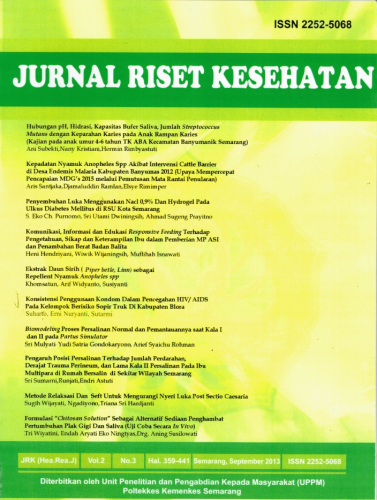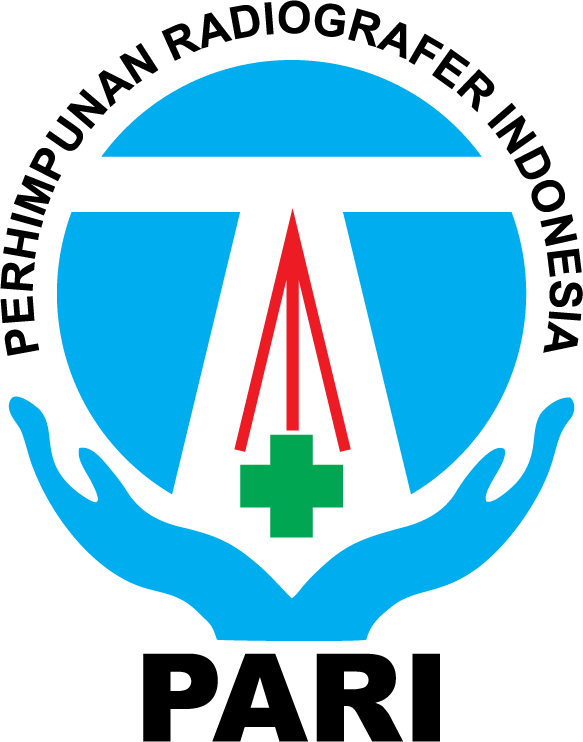HEALTH RISK ANALYSIS OF LEAD LEVELS (Pb) IN GREEN LEAFY VEGETABLES FROM TRADITIONAL MARKETS AND SUPERMARKET IN SEMARANG CITY: A PRELIMINARY STUDY
Abstract
Samples of Green Spinach (Amaranthus gangeticus) Kale or Water Spinach (Ipomoea aquatica) and Green Mustards (Brassica rapa I. Subsp. Perviridis Bayley) were collected from three traditional markets and one supermarket in Semarang City, Central Java. The purpose of this descriptive study was to assess lead (Pb) contamination on raw and boiled vegetables and the health risks for residents in Semarang. The Pb of the samples was measured using atomic absorption spectrophotometer (AAS). The result showed Pb in all samples exceeded the standard values from WHO/FAO (0,3mg/kg), Indonesian National Standard (SNI) limit for Heavy Metals on Food (0,5 mg/kg) and The National Agency of Drug and Food Control of the Republic of Indonesia (BPOM) (0,2 mg/kg). The highest accumulation of Pb found in kale from ‘B’ Traditional Market with 6,123 mg/kg and the lowest was kale from supermarket 0,25 mg/kg. The boiling process for vegetables may increase the Pb concentration, considering the cookware materials. Results revealed that there is no risk of potential health problems for residents in the city with current Pb concentration.
Keywords
Full Text:
PDFReferences
Abdel-Rahman, G. N., Ahmed, M. B. M., & Marrez, D. A. (2018). Reduction of heavy metals content in contaminated vegetables due to the post-harvest treatments. Egyptian Journal of Chemistry, 61(6), 1031–1037. https://doi.org/10.21608/ejchem.2018.3624.1303
Adila, M., & Laz, T. (2016). Lead Levels of Kale Plants in Three Traditional Markets in Cilandak District, South Jakarta. Al-Kauniyah Jurnal Biologi, 7(2), 99–105. https://doi.org/10.15408/kauniyah.v7i2.2722
Agency for Toxic Substances and Disease Registry (ATSDR). (2019). Toxicological Profile for Lead. In ATSDR’s Toxicological Profiles. https://doi.org/10.1201/9781420061888_ch106
Budiari, D., Triani, I., & Hartiati, A. (2016). Pengaruh Frekuensi Pencelupan dan Lama Perebusan terhadap Kadar Logam Berat dan Mutu Sensoris Sawi Hijau (Brassica rapa I. Subsp. Perviridis Bayley). Jurnal Rekayasa Dan Manajemen Argoindustri, 4(1).
El-Kady, A. A., & Abdel-Wahhab, M. A. (2018). Occurrence of trace metals in foodstuffs and their health impact. Trends in Food Science and Technology, 75(January), 36–45. https://doi.org/10.1016/j.tifs.2018.03.001
Elgallal, M., Fletcher, L., & Evans, B. (2016). Assessment of potential risks associated with chemicals in wastewater used for irrigation in arid and semiarid zones: A review. Agricultural Water Management, 177, 419–431. https://doi.org/10.1016/j.agwat.2016.08.027
Erdayanti, P., Hanifah, A., & Anita, S. (2015). Analisis Kandungan Logam timbal pada Sayur Kangkung dan Bayam di Jalan Kartama Pekanbaru secara Spektrofotometri Serapan Atom. JOM FMIPA Bina Widya, 2(1).
Hermina, H., & S, P. (2016). Gambaran Konsumsi Sayur dan Buah Penduduk Indonesia dalam Konteks Gizi Seimbang: Analisis Lanjut Survei Konsumsi Makanan Individu (SKMI) 2014. Buletin Penelitian Kesehatan, 44(3), 4–10. https://doi.org/10.22435/bpk.v44i3.5505.205-218
Hossain, M. S., Ahmed, F., Abdullah, A. T. M., Akbor, M. A., & Ahsan, M. A. (2015). Public Health Risk Assessment of Heavy Metal Uptake by Vegetables Grown at a Waste-water-Irrigated Site in Dhaka, Bangladesh. Journal of Health and Pollution, 5(9), 78–85. https://doi.org/10.5696/2156-9614-5-9.78
Ojezele, O. J., Ojezele, M. O., & Adeosun, A. M. (2016). Cooking Utensils as Probable Source of Heavy Metal Toxicity. Middle-East Journal of Scientific Research, 24(7), 2216–2220. https://doi.org/10.5829/idosi.mejsr.2016.24.07.23516
Onggo, T. (2009). Effect of Concentration of Solutions of Various Lead Compounds (Pb) on Plant Damage, Yields and Some Criteria of Quality of Vegetables in Spinasia Leaves. Retrieved from http://pustaka.unpad.ac.id/wp-content/uploads/2009
Priyanto, B., & Prayitno, J. (2004). Fitoremediasi sebagai Sebuah teknologi Pemulihan pencemaran Khusus Logam Berat.
Puspitarani, D. (2016). Description of Pesticide Use Behavior and Symptoms of Poisoning Caused by Vegetable Sprayers in Sidomukti Village, Bandungan District, Semarang Regency. Universitas Negeri Semarang.
Rai, P. K., Lee, S. S., Zhang, M., Tsang, Y. F., & Kim, K. H. (2019). Heavy metals in food crops: Health risks, fate, mechanisms, and management. Environment International, 125(February), 365–385. https://doi.org/10.1016/j.envint.2019.01.067
Said, S. A. (2015). The Impact of Using the Scratched Utensil on Food Contamination with Heavy Metals. IOSR Journal of Environmental Science Ver. I, 9(5), 2319–2399. https://doi.org/10.9790/2402-09517378
Sattar M.U., Anjum, F. S. A. (2015). Mitigation of heavy metals in different vegetables through biological washing techniques. International Journal of Food and Allied Sciences, 1(2), 40–44.
Triani, I., Gunam, I., & Arnata, I. (2012). Identifikasi dan Pengurangan Kandungan Pb Dan Cd pada Kangkung. In P. Sudjono, Darmanto, & Sunjoto (Eds.), Penelitian Masalah Lingkungan di Indonesia.
UN. (2015). Food Security and Nutrition and Sustainable Agriculture. Retrieved October 15, 2019, from https://sustainabledevelopment.un.org/topics/foodagriculture
US EPA. (2002). Region 9 preliminary remediation goals - EPA Human Health Related Guidance (No. 9355). Washington, DC.
Wani, A. L., Ara, A., & Usmani, J. A. (2015). Lead toxicity: A review. Interdisciplinary Toxicology, 8(2), 55–64. https://doi.org/10.1515/intox-2015-0009
Weidenhamer, J., Kobunski, P., Kuepouo, G., Corbin, R., & Gottesfeld, P. (2014). Lead exposure from aluminum cookware in Cameroon. Science of the Total Environment, 496, :339–347. https://doi.org/10.1016/j.scitotenv.2014.07.016
WHO. (2018). Healthy Diet. Retrieved October 9, 2019, from https://www.who.int/news-room/fact-sheets/detail/healthy-diet
World Health Organization (WHO). (2019). Lead Poisoning and Health. Retrieved October 20, 2019, from https://www.who.int/news-room/fact-sheets/detail/lead-poisoning-and-health
Zhou, H., Yang, W. T., Zhou, X., Liu, L., Gu, J. F., Wang, W. L., Liao, B. H. (2016). Accumulation of heavy metals in vegetable species planted in contaminated soils and the health risk assessment. International Journal of Environmental Research and Public Health, 13(3). https://doi.org/10.3390/ijerph13030289
DOI: https://doi.org/10.31983/jrk.v9i1.5736
Article Metrics
Refbacks
- There are currently no refbacks.
Copyright (c) 2020 Jurnal Riset Kesehatan




















































